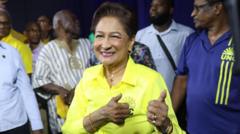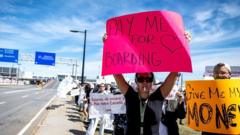Following the resignation of Keith Rowley, the PNM's long-held influence has been disrupted, paving the way for the UNC to address pressing issues such as wage increases and economic recovery. The election was characterized by public discontent over rising crime rates and economic hardships, which the UNC aimed to tackle head-on.
Preliminary results from Monday's election indicate that the UNC has secured a substantial number of parliamentary seats previously dominated by the PNM. Celebrations erupted among UNC supporters overnight as they welcomed the return of Kamla Persad-Bissessar, who previously served as prime minister from 2010 to 2015.
In a gracious concession, PNM leader Keith Rowley acknowledged the defeat, indicating a change in leadership dynamics. His successor, Stuart Young, had recently taken over the prime ministership only to call for a snap election, a move many interpreted as a desperate effort to consolidate power amidst constitutional critiques of his ascension.
Throughout her campaign, Persad-Bissessar focused on critical issues affecting citizens, promising wage increases for public workers and aggressive job creation initiatives. In her victory speech, she highlighted her dedication to public welfare, pledging to secure pensions for seniors, reopen the children's hospital, and ensure that educational opportunities, such as providing laptops for students, are prioritized.
Expressing inclusivity, she assured supporters that "no-one" would be left behind under her leadership, emphasizing that the victory belongs to all citizens of Trinidad and Tobago. As the nation grapples with its challenges, the UNC's win signals a potential new direction in governance and policy-making.
Preliminary results from Monday's election indicate that the UNC has secured a substantial number of parliamentary seats previously dominated by the PNM. Celebrations erupted among UNC supporters overnight as they welcomed the return of Kamla Persad-Bissessar, who previously served as prime minister from 2010 to 2015.
In a gracious concession, PNM leader Keith Rowley acknowledged the defeat, indicating a change in leadership dynamics. His successor, Stuart Young, had recently taken over the prime ministership only to call for a snap election, a move many interpreted as a desperate effort to consolidate power amidst constitutional critiques of his ascension.
Throughout her campaign, Persad-Bissessar focused on critical issues affecting citizens, promising wage increases for public workers and aggressive job creation initiatives. In her victory speech, she highlighted her dedication to public welfare, pledging to secure pensions for seniors, reopen the children's hospital, and ensure that educational opportunities, such as providing laptops for students, are prioritized.
Expressing inclusivity, she assured supporters that "no-one" would be left behind under her leadership, emphasizing that the victory belongs to all citizens of Trinidad and Tobago. As the nation grapples with its challenges, the UNC's win signals a potential new direction in governance and policy-making.




















